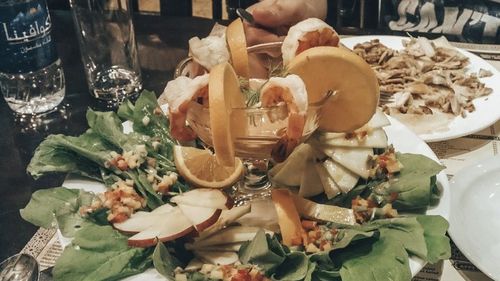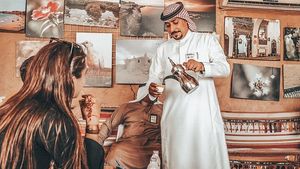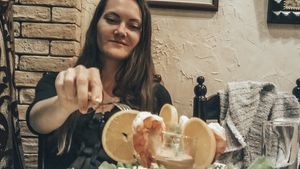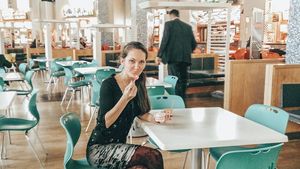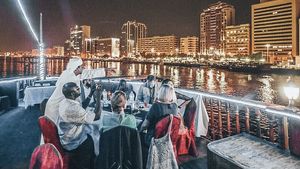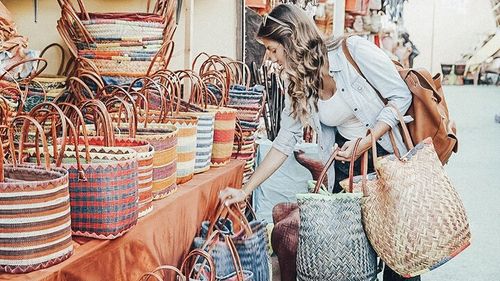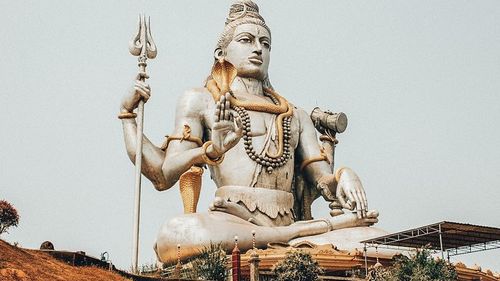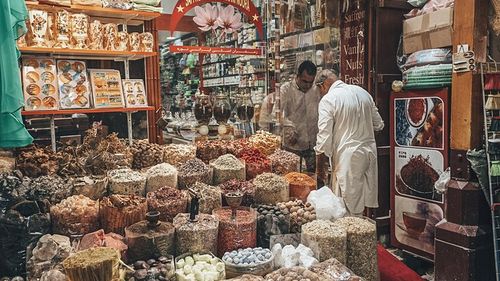Embark on a delightful journey by commencing at the Oud Metha Metro Station to rendezvous with your local guide. Traverse to the stunning Holy Trinity Church, situated in close proximity, while acquainting yourself with the diverse religious landmarks that adorn Dubai. Savor tantalizing Filipino street food to invigorate your senses.
Subsequently, meander down to Al Fahidi Historical District to experience the esteemed Coffee Museum - the epicenter of Arabic coffee lifeline. Immerse yourself in the sophisticated world of coffee, tracing its origins to Yemen and Ethiopia - the Arabica coffee's birthplace. Indulge in a cup of the finest Eastern coffee to elevate your sensory experience. Venture further to relish the authentic Iranian kebab, a favorite amongst locals.
Expand your spiritual horizons by uncovering the hidden gem - the Shiva Temple - an epitome of the intermingling of cultures between India and the United Arab Emirates. Conclude your expedition in the Textile Souk, the oldest trade center of the region, replete with exquisite Arabic-style clothing and souvenirs.
Exploit an opportunity to indulge in traditional Indian snacks, including the delectable Onion Pakora and Samosa before sailing across the Dubai Creek by traditional wooden "abra" boat. Delve into the captivating world of the Spice Souk, awash with mesmerizing scents of exotic herbs and spices. Conclude your day by savoring the succulent dates, a cherished delicacy amongst locals.
Initiate your spiritual excursion at the Holy Trinity Church, nestled in the quaint Oud Metha district. Experience Dubai's colonial past, influenced by Portugal and the British Empire during the 16th to 19th centuries. Dwell in the rich history of coffee, unveiled within the Coffee Museum, tracing its legacy to Morocco and 15th century Yemen and Ethiopia.
The Shiva Temple, a sacred site of Hinduism in the UAE, symbolizes the potent trade nexus between India and the Arabian Peninsula. Bur Dubai's Old Souk, the temple's location, captures traditional architecture's essence. The Textile Souk - an emblem of Dubai's primary trade status during the Persian Gulf's heyday - enabled consummate trade with wealthy India and Persia.
Savor the authentic vibe of Dubai while savoring the majestic vistas of the city aboard a traditional wooden "abra" boat, traversing across Dubai Creek. Conclude your voyage in the Deira district, Dubai's bustling commercial epicenter. Revel in the captivating sights and scents of the Spice Souk as you stroll through its narrow lanes, guided by your experienced local.
Please note this description is an example of foods you might taste and will vary depending on the season, day of the week, and group size.
Begin your delicious adventures by arriving at the Oud Metha Metro Station, where you will meet your local guide. Walk to the beautiful Holy Trinity Church located nearby and learn about the diverse religious sites of Dubai. Spice your walking with some Filipino street food near the church.
Continue to Al Fahidi Historical District and visit the home of Arabic coffee, the famous Coffee Museum. Learn the fascinating legends about the origins of coffee and sample a cup of the finest Eastern coffee. Turn around the corner and continue your tasting by savoring special Iranian kebab at the spot very popular with locals.
Explore the other example of religious mix of Dubai by finding a hidden Shiva Temple. Trace the location of this place by searching around the narrow lines of Bur Dubai Old Souk. Proceed to the Textile Souk, the oldest trade hub of the region where you can buy finest Arabic-style clothing and souvenirs.
Head to another tasty spot where you will try traditional Indian snacks such as Onion pakoda, and samosa. Then cross the Dubai Creek by traditional wooden “abra” boat and wander another vibrant souk of Dubai, the Spice Souk.
Let the charming scents of this place lead you to the many spices, herbs and perfumes this bazaar can offer. End you day in a splendid fashion by participating in the traditional dates tasting.
Your first stop is the Holy Trinity Church in the Oud Mehta district. During the period from 16th to 19th century this area was under the strong influence of Portugal and later the British Empire. The church is the symbol of old connections with western countries as well as the hub for all of the local Christians.
Explore the rich history of coffee inside the atmospheric Coffee Museum. Trace the origins of this prestige drink all the way back to the 15th-century Yemen and Ethiopia. Learn the fascinating legends about Moroccan mystics that discovered the vitalizing effect of coffee.
The Shiva Temple, also known as the Hindu Temple, is the center of Hinduism in United Arab Emirates. It is the only temple in the region devoted to this religion and serves as a representation of trade connections between India and Arabian Peninsula. Temple was built in the 20th century at the vibrant lines of the Bur Dubai Old Souk
The Textile Souk was developed as the result of Dubai’s major trade role on the Persian Gulf. Trade with wealthy India and Persia stimulated foreigners to begin trading in the Dubai. And the many souks on both sides of Dubai Creek started to emerge. Textile Souk was one of the first in the Bur Dubai and has preserved its traditional architecture to our days.
Cross the Dubai Creek via traditional wooden “abra” boat. Learn about its trade significance for Arabian Peninsula and get the authentic experience of exploring Dubai by crossing the Dubai Creek by traditional wooden “abra” boat. While sailing across the creek you will have plenty of time to admire majestic landscapes of the city.
Your last stop is the Deira district, the historic commercial center of Dubai. Here you will introduce yourself to vibrant souk, full of fragrant spices and herbs of the famous Dubai Spice Souk. Explore the narrow lanes this bazaar and discover its finest goods together with your guide.
